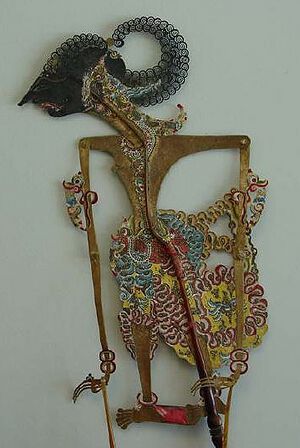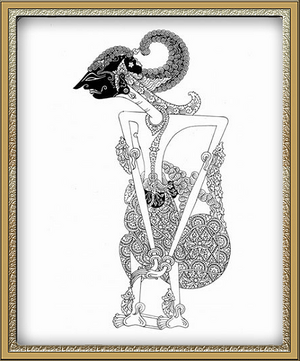Sadewa - (Wayang Kulit): Difference between revisions
(Created page with "{{Puppets |Title=Sadewa - (Raden) - Mahabharata |Other names=Tangsen (young), Tantripala, Grati (in exile), Jayadbala, Sakamara, Madrea, Sahadewa |Size=50 cm |Personal data=Sadewa (Sahadewa), who in Javanese farming is also called Tangsen (=fruit from plants whose leaves can be used and used for medicine) is the fifth/youngest son of Prabu Pandudewanata, the king of Astina with his consort Dewi Madrim, the daughter of Prabu Mandrapati with Goddess Tejawati from the count...") |
No edit summary |
||
| (One intermediate revision by the same user not shown) | |||
| Line 1: | Line 1: | ||
[[File:Sadewa.jpg|thumb|''Sadewa - fifth (youngest) son of Prabu Pandu'']] | |||
[[File:Sadewa.png|thumb]] | |||
{{Puppets | {{Puppets | ||
|Title=Sadewa - (Raden) - Mahabharata | |Title=Sadewa - (Raden) - Mahabharata | ||
| Line 8: | Line 10: | ||
}} | }} | ||
{{Sadewa}} | {{Sadewa}} | ||
[[Category:Wayang Kulit Puppets]] | |||
Latest revision as of 08:48, 10 November 2024
| Title | Sadewa - (Raden) - Mahabharata |
|---|---|
| Other names | Tangsen (young), Tantripala, Grati (in exile), Jayadbala, Sakamara, Madrea, Sahadewa |
| Size | 50 cm |
| Personal data | Sadewa (Sahadewa), who in Javanese farming is also called Tangsen (=fruit from plants whose leaves can be used and used for medicine) is the fifth/youngest son of Prabu Pandudewanata, the king of Astina with his consort Dewi Madrim, the daughter of Prabu Mandrapati with Goddess Tejawati from the country of Mandaraka. He was born as a twin with his brother, Nakula. Sadewa also has three brothers, one father, the son of Prabu Pandu and Dewi Kunti, from the country of Mandura, named; Puntadewa, Bima/Werkundara and Arjuna. |
| Appearance | Sadewa has the character of being honest, loyal, obedient, compassionate, knows how to repay benefits and can keep secrets. |
| Collection | Private collection |
Sadewa - (Raden) - Mahabharata
Sadewa is a drop of Bathara Aswin, the God of Medicine. He is very skilled in the knowledge of kasidan (Javanese)/a mystic, horse riding and skilled at using arrows and spears. Apart from being very powerful, Sadewa also has Aji Purnamajati, a gift from Ditya Sapulebu, Senapati of the Mretani state, which is efficacious; can understand and remember clearly all events. Sadewa lives in the Bawenatalun/Bumiretawu kesatrian, Amarta country area.
After the end of the Bharatayuda war, Sedewa became the duke of Astina country accompanying King Kalimataya/King Yudhistrira. At the end of his story, Sahadewa died together with his four brothers.
Raden Nakula and Sadewa
These two knights were twins, the sons of Pandu from Empress Dewi Madrim, brother of Prabu Salya, king of the Madraka country. When they were children, Nakula and Sadewa were named Pintèn and Tangsèn. The twins' loyalty to their three older brothers never wavered. All five have the same stance and are a strong fortress.
His twin brother is named Nakula. Sadewa and Nakula are the incarnations of twin gods, namely Dewa Aswin. Sadewa has a wise nature, in fact he is the wisest compared to the other Pandavas. His older brother, Yudistira, once said that Sadewa was wiser than Wrehaspati, the teacher of the gods. The youngest son of Prabu Pandu had expertise in astrology or astronomy. He was able to know future events, but he was once cursed, if he revealed the secret of fate, his head would split in two. He is also good at cattle breeding. When the Pandavas underwent a period of disguise in the Matsya Kingdom because they lost playing dice with the Korawa, Sadewa disguised himself as a cowherd named Tantripala.
Sadewa's wife was named Jarasanda, daughter of the king of the Magadha Kingdom. From this marriage, they had a son named Suhotra. Meanwhile, Draupadi was blessed with a son named Srutakirti. In wayang, Sadewa only has one wife, namely Perdapa, daughter of Resi Tambrapetra. From this marriage, they were blessed with two children named Niken Sayekti and Bambang Sabekti. Each of them married Nakula's children named Pramusinta and Pramuwati.
The Baratayuda war
When the Baratayuda war almost broke out, Pendawa felt anxious about facing the powerful and patient king. At Sri Kresna's discretion, Nakula and Sadewa were sent to King Salya to calm his anger. Therefore, Prabu Salya did not have the heart to be hostile towards Pendawa considering that the five brothers were his own nephews. So when the Baratayuda war broke out, King Salya did not fight with all his enthusiasm, which resulted in the Pendawa winning the war. On the 18th day of the war, Sadewa fought against Sengkuni, and succeeded in defeating Sengkuni with his sword. Sengkuni is the younger sister of Dewi Gendari, the mother of Korawa. He was cunning and liked to pit the Pandavas and Korawas against each other, resulting in the Bharatayudha war erupting. In Kakawin Sudamala, an Old Javanese literary work inherited from the Majapahit Kingdom, Sadewa is the main character.
In the text, it is said that Bathara Guru's wife named Umayi was cursed because she had an affair with Bathara Brahma. Because of that curse, Umayi turned into a Rakshasi named Ra Nini. Ra Nini will return to her original form, if treated by the youngest Pandawa. Therefore, Sadewa was kidnapped and forced to lead the ruwatan procession. After being possessed by Batara Guru, Sadewa was able to carry out Ra Nini's request. Because of this, he later received the nickname Sudamala, which means "eliminating disease". With the guidance of Ra Nini who had turned into Umayi, Sadewa went to Prangalas village to marry a hermit's daughter named Predapa.
After the end of the Bharatayuda war, Sedewa became the duke of Astina country accompanying King Kalimataya/King Yudhistrira. At the end of his story, Sadewa died on his way to the peak of the Himalayas with the Pandavas and their wife Draupadi.
Nakula has twined eyes, a pointed nose, and a long Kluwih flower-trimmed bun. Stretching necklace. Ringing, popping and curling. Clothed son's butt. Nakula and Sadewa berwanda: Banjet and Bontit.
Blog: Hadisukirno – Yogyakarta - 2011
Source: History of Wayang Purwa - Hardjowirogo - PN Balai Pustaka - 1982
More info:


